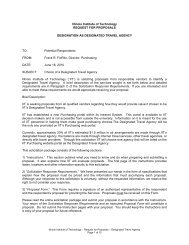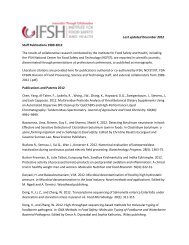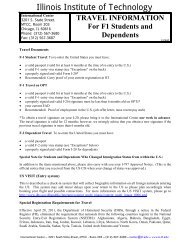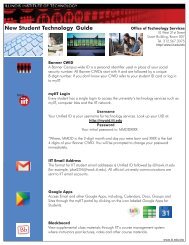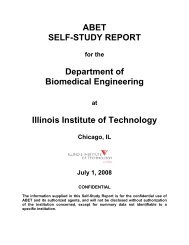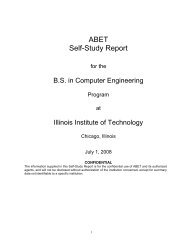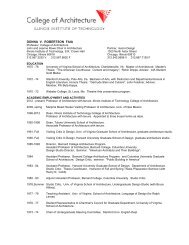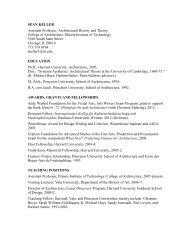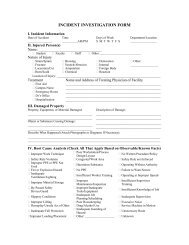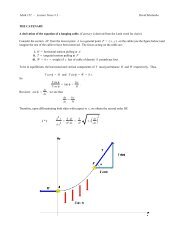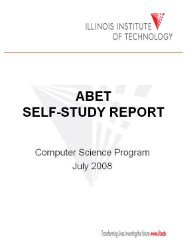Undergraduate Bulletin - Illinois Institute of Technology
Undergraduate Bulletin - Illinois Institute of Technology
Undergraduate Bulletin - Illinois Institute of Technology
You also want an ePaper? Increase the reach of your titles
YUMPU automatically turns print PDFs into web optimized ePapers that Google loves.
Course Descriptions<br />
BUS 456<br />
Financial Economics I<br />
This course provides a systematic exposition <strong>of</strong> the primary<br />
mathematical methods used in financial economics.<br />
Mathematical concepts and methods include logarithmic<br />
and exponential functions, algebra, mean-variance analysis,<br />
summations, matrix algebra, differential and integral calculus,<br />
and optimization. The course will include a variety <strong>of</strong> financial<br />
applications including compound interest, present and<br />
future value, term structure <strong>of</strong> interest rates, asset pricing,<br />
expected return, risk and measures <strong>of</strong> risk aversion, capital<br />
asset pricing model (CAPM), portfolio optimization, expected<br />
utility, and consumption capital asset pricing (CCAPM).<br />
Prerequisite(s): [(BUS 351)]<br />
(3-0-3)<br />
BUS 457<br />
Financial Modeling I<br />
This course is the first <strong>of</strong> three subjects that form the<br />
Financial Modeling Sequence. It is designed to provide<br />
students with the necessary programming skills necessary to<br />
create realistic financial models. It is an essential core subject<br />
and must be completed in order to obtain the MSF degree.<br />
Modeling I focuses on the implementation <strong>of</strong> financial models<br />
in MS Excel using Visual Basic for Application (VBA).<br />
Prerequisite(s): [(BUS 351)]<br />
(3-0-3)<br />
BUS 458<br />
Futures Options & OTC Derivatives<br />
This course provides the foundation for understanding the<br />
price and risk management <strong>of</strong> derivative securities. The<br />
course starts with simple derivatives (e.g., forwards and<br />
futures) and develops the concept <strong>of</strong> arbitrage-free pricing<br />
and hedging. Based upon the work <strong>of</strong> Black, Scholes, and<br />
Merton, the course extends their pricing model through<br />
the use <strong>of</strong> lattices, Monte Carlo simulation methods, and<br />
more advanced strategies. Mathematical tools in stochastic<br />
processes are gradually introduced. Particular emphasis is<br />
given to the pricing <strong>of</strong> interest rate derivatives.<br />
Prerequisite(s): [(BUS 221, BUS 321, and BUS 351)]<br />
(3-0-3)<br />
BUS 467<br />
Managing Entrepreneurial Enterprise & the Global Marketplace<br />
BUS 467 focuses on the behaviors <strong>of</strong> entrepreneurs (both<br />
successful and unsuccessful), entrepreneurial networks, the<br />
venture creation process, new venture strategies, identification<br />
and evaluation <strong>of</strong> new venture opportunities, new<br />
venture financing, legal and tax considerations, market entry<br />
strategies, and the development <strong>of</strong> a formal business plan in<br />
a global context.<br />
Prerequisite(s): [(BUS 351)]<br />
(3-0-3)<br />
BUS 468<br />
Creating & Managing the Sustainable Entrepreneurial Enterprise<br />
This course examines innovative organizations that are<br />
created to improve people’s lives and that contribute to<br />
improved social and economic conditions. It focuses how<br />
these organizations sustain themselves, how their impact and<br />
performance is measured, how their leaders create and spread<br />
their innovation and change, and characteristics possessed by<br />
their leaders.<br />
Prerequisite(s): [(BUS 466)]<br />
(3-0-3)<br />
BUS 469<br />
Entrepreneurship Minor Summit Course<br />
BUS 469 provides students a hands-on, real world opportunity<br />
to: 1) identify, investigate and/or evaluate the suitability <strong>of</strong><br />
a product or service to the marketplace; 2) work with an<br />
existing company to evaluate and/or investigate a product<br />
or service opportunity for the company; or 3) investigate<br />
and/or evaluate a research-based technology for suitability as<br />
a product or service. Students will either build or join a small<br />
team to develop a protype, engage customers/partners, and<br />
identify support and/or funding. Business students who have<br />
taken the prerequisite (or equivalent) courses may register<br />
with instructor approval. Prerequisite: Entrepreneurship<br />
Minor Classes (4) and IPRO<br />
(3-0-3)<br />
BUS 471<br />
Marketing Management<br />
The Marketing Management course is designed to provide<br />
students with an overview <strong>of</strong> the decision making process in<br />
marketing. Marketing decision-making is a process that is<br />
essentially wrapped around the fundamental goal <strong>of</strong> creating<br />
value in the marketplace. This requires a pr<strong>of</strong>essional<br />
knowledge <strong>of</strong> market drivers, competitors’ capabilities, technological<br />
trends, and the market dynamics <strong>of</strong> value. The<br />
orientation is toward the kinds <strong>of</strong> marketing decisions that<br />
managers must make within the modern business environment.<br />
A primary goal <strong>of</strong> this course is to provide a thorough<br />
understanding <strong>of</strong> the rapidly changing business environment<br />
and the various stakeholders that influence the marketing<br />
management function.<br />
Prerequisite(s): [(BUS 371)]<br />
(3-0-3) (C)<br />
BUS 472<br />
New Product Development<br />
This course <strong>of</strong>fers students a solid grounding in the theory and<br />
practice <strong>of</strong> new product development. Using a combination<br />
<strong>of</strong> theory-based lecture, hands-on exercises and assignments,<br />
and discussion, students will develop skills across the entire<br />
product development process–from opportunity identification<br />
through product launch.<br />
Prerequisite(s): [(BUS 371)]<br />
(3-0-3) (C)<br />
BUS 473<br />
Marketing Research<br />
This course provides students with a detailed exposure to<br />
state-<strong>of</strong>-the-art marketing research techniques and their<br />
applications. Topics include: problem definition, research<br />
design, exploratory research, the use <strong>of</strong> secondary and<br />
syndicated data sources and questionnaire development and<br />
analysis. Course exercises and projects will emphasize the<br />
use <strong>of</strong> research information for effective marketing decision<br />
making.<br />
Prerequisite(s): [(BUS 371)]<br />
(3-0-3) (C)(E)<br />
BUS 475<br />
Sales Management<br />
Addressing modern technology and methods <strong>of</strong> selling and<br />
presenting highly technical subjects is the basis <strong>of</strong> this course.<br />
Engineers, Information Technologists, Architects, and those<br />
dealing with state <strong>of</strong> the art products will benefit from this<br />
new created course that will address the rapidly changing<br />
pr<strong>of</strong>ession <strong>of</strong> highly skilled representatives, sales persons,<br />
and entrepreneurs. The class content will include guest<br />
speakers from technical corporations, leading promotion and<br />
e-commerce firms to discuss basic requirements for sustaining<br />
current customer base and increase gross sales. Application,<br />
simulation and case studies from small and mid-sized firms<br />
will be reviewed.<br />
Prerequisite(s): [(BUS 371)]<br />
(3-0-3)<br />
197



